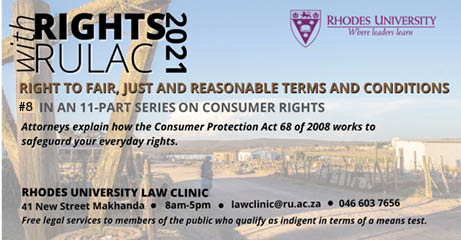The final part of chapter 2 of the Consumer Protection Act is designed to protect consumers who are party to certain common transactions where the consumer must perform in advance of receiving goods or services, or where suppliers have physical control of property belonging to the consumer. Parliament understood that such consumers are vulnerable to dishonest suppliers, and established rules to protect consumers in such transactions.
Lay-bys
The obvious example of this type of transaction is the lay-by. A lay-by agreement is an agreement in which you buy something by paying it off in instalments, and the supplier keeps the goods until you have finished paying all the instalments.
Yoliswa’s daughter is due to be married in December 2020 and the lobola negotiations will take place at Yoliswa’s house. Yoliswa wants the husband-to-be’s parents to be impressed so, in January 2020, she buys a new lounge suite on lay-by for R14 000.00. She pays off the lounge suite in monthly instalments of R2000.00 and finishes her payments in October 2020. When she tries to arrange for the lounge suite to be delivered, the supplier tells her that it made a mistake and had sold the lounge suite to someone else. What can she do? And what would be the position if Yoliswa fails to pay an instalment?
The Act states that the instalments paid by Yoliswa will remain her money until the lounge suite has been delivered to her. If anything happens to the lounge suite before delivery, that is the responsibility of the supplier. If the supplier cannot deliver the lounge due to reasons out of its control, then the supplier must provide her with a similar lounge suite, refund her, with interest, if the reason for the goods not being supplied are beyond the supplier’s control, or pay double the amount paid by the consumer, if the supplier has no good reason for breaching the agreement.
However, if Yolisa fails to pay an instalment, or fails to pay the full price for the goods within 60 business days of the anticipated date of completion of the contract, then the supplier may cancel the contract, charge Yolisa a cancellation penalty, but must refund her all the money she has paid up to that time.
Similar protections apply to other equivalent transactions.
(a) Prepaid certificates, credits and vouchers
Such transactions require a consumer to pay money in advance for a certificate, card, voucher or similar device that will allow the presenter of it in due course to claim goods or services up to the value paid. The money paid upfront remains the property of the consumer until it is redeemed. Such vouchers only expire once their credit is depleted by using it to acquire goods or services for their full value, or (if it is not so used) after three years from the date of issue.
(b) Prepaid services, and access to service facilities
Similarly, if a consumer is required to pay a one-time or periodic membership fee; or any amount in respect of services or access to services to be provided at a date more than 25 business days after the payment is made, the amount paid remains the property of the consumer until the supplier makes a charge against it.
The supplier to hold and account for the consumer’s property
To reinforce the legal position set out above in regard to these three forms of transaction, the Act goes on to require a consumer in such cases to hold and account for the consumer’s property. So, when a supplier has possession of any prepayment, deposit, membership fee, money, or property belonging to a consumer, the supplier must:
- not treat that property as being the property of the supplier; and
- in the handling, safeguarding and using that property must exercise the degree of care, diligence and skill that can reasonably be expected of a person responsible for managing any property belonging to another person. The supplier will be liable to the owner of the property for any loss resulting from a failure to comply with the required standard.
Deposits, and return of parts and materials
Lastly, this part of the Act sets rules in regard to a consumer’s entitlement to repayment of a deposit for the return of goods such as bottles or pallets; and a consumer’s rights where goods have been handed to a supplier for maintenance or repair – specifically, to keep any removed parts and to return these to the consumer, unless the consumer declines their return.


